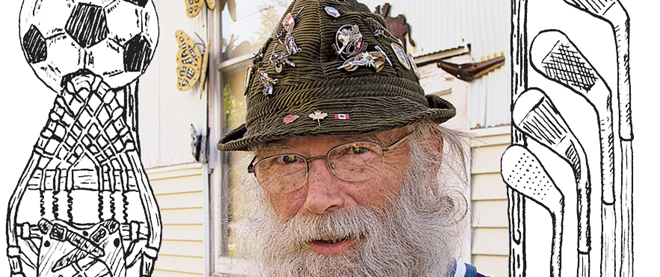James Forrest Kienholz
He was meticulous, unmaterialistic and frugal, waiting until his 65th birthday to get the seniors’ rate on a fishing licence
Illustration by Team Macho
Share

James Forrest Kienholz was born in Nelson, B.C., on Sept. 12, 1946, the first of five siblings (Melvin arrived next, then Lorraine, David and Beverley). James’s father, Forrest, was a Greyhound bus driver; his mother, Malendar (neé Davidson), was the anchor of the family home. “I had a house full of kids all the time,” she says. “I always baked bread and buns on Monday mornings, and all five kids wanted to bring a friend home for cinnamon buns. I let them each to bring one, so that meant 10 kids every Monday morning.”
As a child, Jim was a natural athlete. He spent the summers playing baseball and soccer and anything else that kept him outdoors. When the kids went fishing on Kootenay Lake, Jim always took the time to bait his little sister’s hook. “We would collect grasshoppers from my grandmother’s backyard and use them for bait,” Lorraine remembers. The family had a cat named Mittens. Jim’s pet rabbit was Sniffles.
When he was 13, a family of refugees from the former Yugoslavia moved in across the street. Dan Skopac barely spoke a word of English, but Jim and his brothers welcomed him to Canada, sharing their Batman comic books and teaching him the language (good words and bad). “Jim was three years older, and I just thought he was such a cool guy,” says Skopac, who remained lifelong friends with the Kienholz boys. “He had his comb-back hair with the Brylcreem and he looked like James Dean and Edd ‘Kookie’ Byrnes and Fabian all rolled into one.”
After high school, Jim worked at a rail yard before taking a job at the local sawmill. He was a diligent employee, a stickler for doing things the right way, but he was far more passionate about what he did away from work. Jim played competitive adult-league soccer (goalie), loved to snowshoe and mountain climb, and was a member of the community’s search-and-rescue squad. Few in Nelson knew the surrounding wilderness better than he did.
Few spent more time at the hockey arena, either. Beginning in his twenties—and continuing over the next four decades—Jim volunteered as a scorekeeper for the Nelson Leafs, the city’s Junior B squad. Game after game, he and his long, grey beard sat ice-level between the penalty boxes, recording every goal, assist and high stick. “It sounds simple but it’s really not,” says Gordon Davis, the team’s treasurer. “You have to know what you’re doing, and he had that down to a science. He was a bit of a perfectionist.”
His collections—stamps, coins, sports cards—were treated with equal care, neatly catalogued and stored in the old Douglas Road home, which he purchased from his mother. “He was very meticulous,” Lorraine says. “I would say he was even a bit eccentric.”
He was certainly not materialistic. When the mill closed in the 1980s, Jim worked odd jobs as a carpenter or electrician, earning just enough money to get by. He walked to the rink. He didn’t have cable. And his telephone was rotary, the same one that had always been there. “That was Jim in a nutshell,” says Roger Bond, a close friend. “He was a very simple man, very frugal, but a really good person.” Even in his later years, when he discovered golf, Jim used his dad’s ancient wooden clubs—and still managed to shoot regular rounds in the mid-80s. “He hit it long and he hit it straight, and the rest of us would hit it here and there,” his sister says. “But he would always go and find them for us. He never, ever was not able to find a golf ball that we lost in the woods.” In fact, Jim found thousands of them over the years, filling an entire bedroom. Each ball was laid out on the floor in precise rows, organized by brand.
Still an avid fisherman, Jim recently told friends that he was waiting until Sept. 12—his 65th birthday—to buy a licence. By then, he would qualify for the senior citizen rate. “He didn’t waste his money on anything,” says his mother, now 89. “That is just the way he was.”
On Aug. 24, a Wednesday, Jim climbed aboard a float plane that belonged to a family friend. He and the pilot were supposed to spend two days camping and fishing at Fortress Lake, near the B.C.-Alberta border. “As they were flying, Jim was pointing out all the mountain ranges and saying which ones he’d climbed to the top of,” Lorraine says. The conversation turned to fishing—and the fact that Jim didn’t have a licence. Worried about a fine, the men decided to make a pit stop in Nakusp, a shoreline village, to purchase one. The pilot survived the watery crash. Jim drowned.